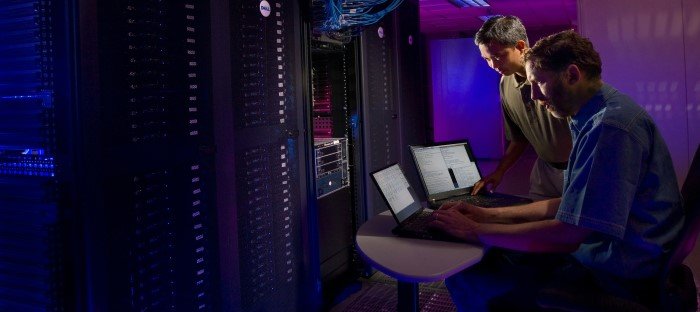Is Colocation Right for Me?
Colocation refers to the practice of placing your servers and other IT equipment alongside others’ equipment (thus: co-location) into a data centre operated by a third party. Of course, this is much cheaper than building your own data centre, but there are also a host of other benefits.
Colocation offers a range of benefits to different organisations, either at the early stages of the IT development life-cycle, or for continued development within mature, experienced organisations, whether it be centralising IT equipment and services, increasing availability through resilience in power infrastructure, global network connectivity, or access to 24/7/365 support services on-site.
By addressing a number of key risks through colocation, organisations are able to concentrate on delivering their services to their customers without having to focus on the operational infrastructure underpinning the success of their business.
The basics of colocation:
- Every business has to run servers to facilitate their computer services, and these need a connection to the internet.
- Physical storage and location of these servers can become a complicated issue as a company grows.
- Keeping the servers in a dedicated server room has several issues:
- The energy costs to run and cool your servers
- Servers need to be monitored 24 hours a day by a technical engineer
- Server room can be difficult to keep secure
- Moving your servers into a data centre solves these issues, as well as providing an Uninterruptable Power Supply (UPS) to mitigate power failures.
- Data centres contain many ‘racks’ of servers, and clients rent as many racks as their equipment requires.
- Some data centres have eco-friendly cooling systems which use evaporation to reduce energy use.
Key benefits
Create room to grow
Your in-house servers take up space that could be used by desks. Moving your equipment into a colocation centre will free this up, and let you grow your numbers without having to look at a bigger office.
Power Supply Redundancies
Data centres use uninterruptable power supplies and generators to protect equipment from power failure, which guarantees your IT systems keep running and prevents any damage a power failure could cause.
Your IT infrastructure can grow as well
If you need to expand your IT equipment beyond the space you have in your office this could cause a severe problem and stifle the progress of your company. Once you move to rack space in a colocation data centre, then you’ll never have to worry about finding the room to expand your equipment again.
Connectivity Options
Running your essential computer services from your office internet connection can lead to problems when that connection experiences service issues. Data centres operate in a ‘carrier-neutral’ way, which is what allows some of them to have an SLA of 99.999% network uptime.
Peace of mind
Data centres deploy sophisticated redundancies for power, cooling, and internet connectivity. They’ll keep your system online at all times, and you don’t need to worry about the potential fall out of a system outage.
Efficient Cooling Systems
Servers and other IT equipment can generate a lot of heat, and cooling them can be very expensive. Data centres run a lot more efficiently than traditional air conditioning units, keeping costs down.
Lower costs
Data centres are incredibly efficient with their energy use, meaning that their operating costs per server is a lot lower than in-house setups. If you colocate with a data centre, they pass this saving on to you, and the fees you pay them will be considerably lower than your running costs.
Utilise the latest computing technology
Recently there has been a massive uptake in the use of high-performance computing, which has allowed companies to use their computers in ways never achieved before. However, this requires extensive infrastructure and expertise to run, and the most practical and cost-effective way to access this technology is by utilising a data centre.

Remote Hands
Your equipment is secured within the data centre, with qualified technical engineers monitoring the environment and performance. If you need to make a physical change these tasks can be performed by the team without the requirement of you visiting the site.
Less to think about
With a data centre responsible for the upkeep of all of the cooling, power, and connectivity equipment, you no longer need to worry about them. Additionally, data centre engineers keep an eye on your servers and make you aware of any problems you might have, so you no longer need to spend so much time monitoring them.
If you think colocation might be something you’d like to consider for your business, or if you’d like to get further information, please get in touch.






